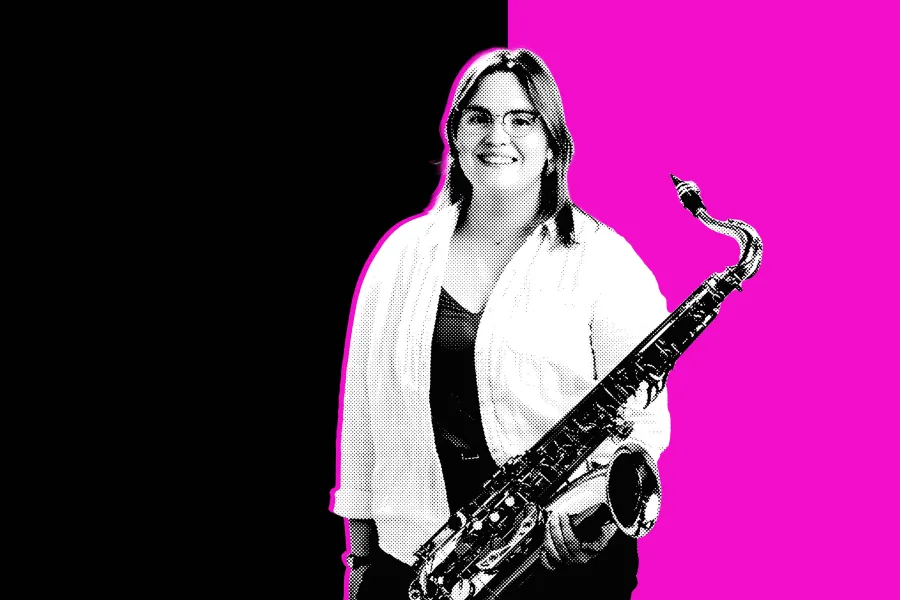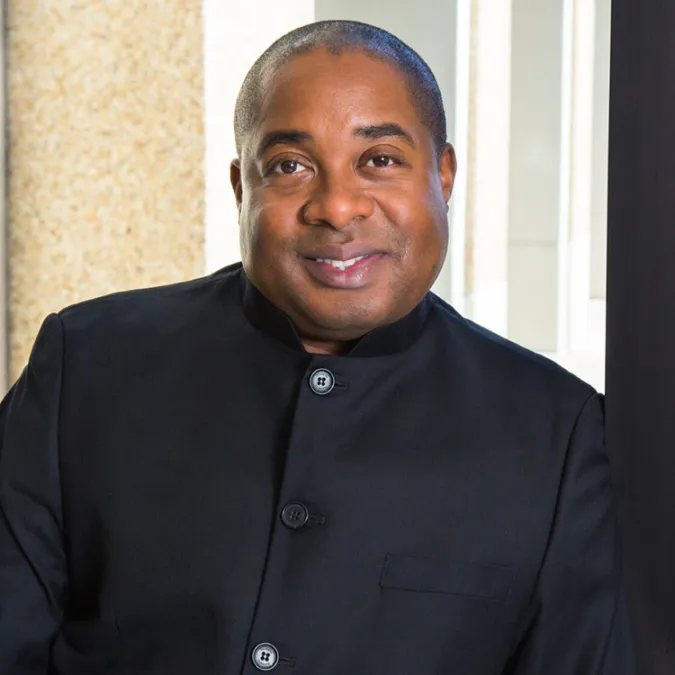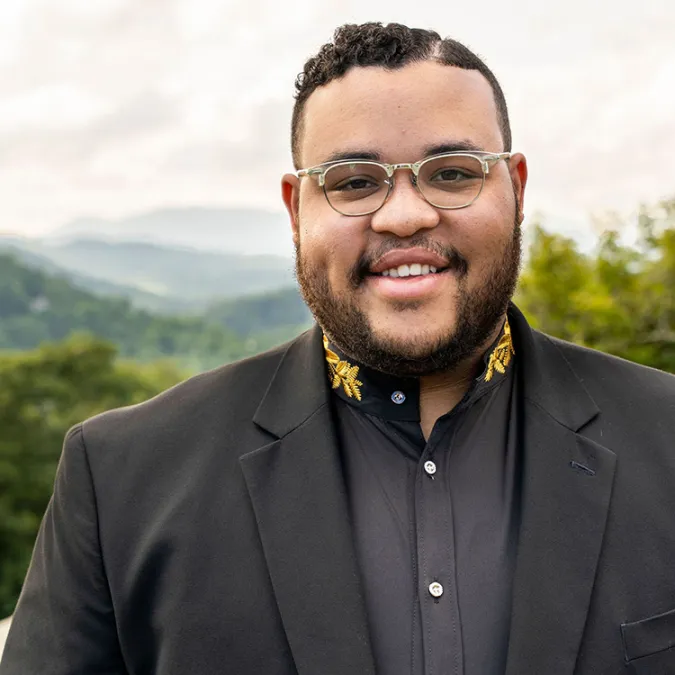
Cliff Croomes, conductor
T.j. Anderson, guest conductor
This concert will last about 40 minutes without intermission.
Please silence your electronic devices.
Photography, video, or recording of any part of this performance is prohibited
Program
Óscar Navarro
New Dawn
Richard Strauss
trans. Davis, ed. Fennell
Allerseelen, Op. 10, No. 8
Gustav Holst ed. Matthews
Second Suite for Military Band, Op. 28, No. 2
March
Song Without Words
Song of the Blacksmith
Fantasia on the Dargason
T.j. Anderson, conductor
Anthony Barfield
The Tree of Life
Michael Markowski
Instinctive Travels
About the Program
Program notes by Mark Bilyeu except where noted.
Óscar Navarro
New Dawn
Born 1981, Novelda, Spain
Composed 2022
Premiered November 4, 2023 Southeastern Louisiana University Wind Symphony, Robert Schwartz, conductor
Duration 6 minutes
Spanish composer and conductor Óscar Navarro has been recognized throughout the world for both his concert and film music. “New Dawn is an overture inspired by a new dawn in which we can leave behind dark and unstable years in which humanity has been exposed to infinite turbulent changes that have put us to the test every day,” writes the composer. “With this overture I would like to launch a positive message of light and hope, where the sound of music reigns over the sound of weeping and despair. An effervescent music, full of rhythm and color built through a simple theme with a certain childish tint, which evolves in a continuous crescendo until the end. During the course of the overture, a couple of nods to Tchaikovsky’s Symphony No. 5 in E Minor will be heard, which bring to mind the figure of maestro Odón Alonso, who ended his tenure as conductor of the “Festival Otoño Musical Soriano” [“Musical Autumn Festival Soriano”] by performing said symphony for which he had a special affection. Every day offers us a new dawn, and every dawn is a new opportunity to continue enjoying the gift of life.”
Richard Strauss
Allerseelen, Op. 10, No. 8
Born June 11, 1864, Munich, Germany
Died September 8, 1949, Garmisch-Partenkirchen, Germany
Composed October 3, 1885
Premiered March 5, 1886, Meiningen, Germany
Duration 6 minutes
Richard Strauss was only 21 years old when he published his first set of songs: a grouping of eight songs all on the poems of Hermann von Gilm’s poetry collection Letzte Blätter (“Last Pages”). Strauss published them as his Op. 10, titling them Acht Lieder aus Letzte Blätter, and they remained some of his most popular songs to date—due in large part to his own performances of them both in Europe and during his 1921 American tour with the German soprano Elena Gerhardt. The poem—already well known to the public before Strauss set it—is titled after All Soul’s Day, a time for people to remember those whom they have lost. It had already been given musical life by the Danish composer Eduard Lassen, but in Strauss’ hand, the romantic undertones of the poem emerge, with a spinning melodic line over lush harmonic texture that would make Struass’ hero Wagner proud indeed.
Gustav Holst
Second Suite for Military Band, Op. 28, No. 2
Born September 21, 1874 Cheltenham, UK
Died May 25, 1934, London, UK
Composed 1911
Premiered June 30, 1922, Military School of Music Band, Lt. Hector E. Adkins, conductor, Royal Albert Hall, London
Duration 12 minutes
Gustav Holst composed two suites for wind band in 1909 and 1911 for the sheer joy of it. Due mainly to the inconsistent and fluctuating instrumentation from ensemble to ensemble, British military bands of the day primarily played transcriptions of popular orchestral works, and so this original music for wind band was a shockingly new concept. For this second suite, Holst turned exclusively to the folk songs collected by Dr. G. B. Gardiner and Cecil Sharp. In his fist movement, we hear "Glorishears," "Swansea Town," and "Claudy Banks," and the second movement is based on Song Without Words: “I’ll Love My Love.” The third movement is based on the bright and brassy "Song of the Blacksmith," and the fourth movement features the Fantasia on the Dargason, before a joyful "Greensleeves" arrives to close it out. The work—now core repertoire for wind band—was premiered by the same ensemble that premiered the first suite.
Anthony Barfield
The Tree of Life
Born 1983, Collinsville, MS
Composed 2012
Premiered The University of Madison-Wisconsin Symphonic Band
Duration 7 minutes
“According to the book of Genesis in the Bible, the Tree of Life is a tree planted by God in the midst of the Garden of Eden whose fruit gives everlasting life. This work paints a picture of the tree's knowledge of good and evil while also displaying an overall serenity of the Garden.” Anthony Barfield is an Emmy Nominated composer and multi-platinum producer based in New York City. Known for his lyrical writing style, his compositions have been performed throughout the U.S., Europe and Asia. Anthony has received commissions from organizations such as The New York Philharmonic and Lincoln Center for the Performing Arts with performances by orchestras such as The Toronto Symphony, The Seattle Symphony and Kansas City Symphony. He holds degrees in trombone performance from the Juilliard School and Manhattan School of Music and is on Faculty at Boston Conservatory at Berklee.
Michael Markowski
Instinctive Travels
Born November 14, 1986, Mesa, AZ
Composed 2009
Duration 7 minutes
The title, Instinctive Travels, was somewhat influenced by the 90’s hip-hop album People’s Instinctive Travels and Paths of Rhythm by the group Tribe Called Quest. One of the things I love about the hip-hop genre is an attraction to complex rhythm and metric design. While there are no traditional “hip-hop beats” in this symphonic work, the piece is incredibly infected by rhythm, particularly a primary ostinato and other small fragments. For me, there is also something primal about rhythm that inspired a more animalistic and chaotic musical landscape. For the listener — and especially the musicians! — there is little breathing room among the tension. As the musical action reaches its peak, the brass choir recites a quotation of the hymnal "All Things Bright and Beautiful." This comes as a brief release, but remains plagued by the primary rhythmic motif, stated sharply in the upper woodwinds. The evolution of the piece continues to modulate and expand, never officially reaching a traditional climax. Instead, the ending is abrupt and open (in 5ths) until the search for resolution and climactic payoff can start again, perhaps in another piece. The melody is a 17th century tune called “Royal Oak,” known also as the hymn “All Things Bright and Beautiful”... To better understand why I quoted this hymn, it’s interesting to know that the working title for this piece was originally, “From So Simple A Beginning,” which is a quote from the closing paragraphs of Darwin’s The Origins of Species: “There is grandeur in this view of life, with its several powers, having been originally breathed into a few forms or into one; and that, whilst this planet has gone cycling on according to the fixed law of gravity, from so simple a beginning endless forms most beautiful and most wonderful have been, and are being, evolved.” The piece is inherently animalistic, primal, and constantly evolving.
—Michael Markowski
About the Artists
Cliff Croomes

Cliff Croomes serves as the Associate Director of Bands and Director of the Longhorn Band at the University of Texas at Austin. Prior to this appointment, Croomes was the Assistant Director of Bands at Louisiana State University and the Music Director and Principal Conductor of the Civic Orchestra of Baton Rouge. Previous to his appointment the faculty he studied at LSU for his Master of Music and Doctor of Musical Arts degrees. Dr. Croomes earned his Bachelor of Music Studies degree from the University of Texas at Austin and is an alumnus of the Cavaliers Drum and Bugle Corps from Rosemont, Illinois. He has performed with ensembles throughout the United States, London, Paris, Switzerland, Germany, Italy and consulted throughout Japan. Dr. Croomes holds an endorsement with Innovative Percussion Inc. and is a founding board member of the composer diversity initiative “And We Were Heard” as well as a member of the Dr. William P. Foster Project advisory board. Dr. Croomes also holds an honorary membership in Kappa Kappa Psi.
T.J. Anderson

T.j. Anderson (he/him) is currently pursuing a Doctor of Musical Arts Degree in Wind Conducting as a Graduate Teaching Assistant at the University of Texas at Austin. He earned his Bachelor’s Degree in Music at Coastal Carolina University, focusing on percussion under the mentorship of Dr. Jesse Willis. T.j. continued his education by pursuing a Master’s Degree in Instrumental Conducting at Appalachian State University. There, he studied primarily with Dr. John Stanley Ross. As a graduate teaching assistant, T.j. made contributions to university bands, teaching conducting, band literature, and band methods courses. He also worked with the Marching Mountaineers as a winds and percussion instructor/arranger and served as Musical Director for the Appalachian Concert Band. In addition to his academic pursuits, T.j. has held leadership roles as Artistic Director and Conductor of the Festive Brass and Assistant Conductor of the Carolina Master Chorale. He is an active member of various professional music and education organizations and has been recognized as an Honorary Brother of Kappa Kappa Psi, Phi Mu Alpha Sinfonia, and a Sigma Alpha Iota Friend of the Arts.
Symphony Band
Flute
Josey April
Gerardo Ayala
Micah Bronaugh
Juan Fajardo
Zachary Gray
Charlotte Karner
Rabeeba Mahaseen
Natalie Porter
Sophie Sheara
Oboe
Emma Ball
Spencer Dwyer
Zane Laijas
Reagan Tompkins
Tara Tran-Huu
Kevin Xiong
Clarinet
Georgia Castillo
Natalie Eddings
Michael Golston
Daniel Ortiz
Darien Salter
Brian Song
Jesus Trejo
William Zheng
Bassoon
Raymundo Benavides
Gabriela Jensen
Lauren Kansey
Naomi Kitamura
Gavin Malden
Carson McKay
Sabrina Pector
Judith Salas
Saxophone
Phoenix Alcera (alto)
Austin Davidson (alto)
Luc Billette (alto)
Ben Crowley (tenor)
Nigel Duplessis (baritone)
Sasha Sanchez (alto)
Daniel Kim (alto)
Chantal Lee (alto)
Pablo Ramon (Alto)
Joseph Lowry (tenor)
Brandon Shen (baritone)
Horn
Timothy McCormick
Bianca Miller
Luke Onorato
Elizabeth Whitehead
Trumpet
Jaime Hernandez
Dash Kostka
Matthew Nichols
Christophe Ray
Trombone
Jan Campos
Joshua Gault
Jackson Hawk
Michael Newell (bass)
Ryan Smalley (bass)
Euphonium
Casey Hawthorne
Eric Ingram
Tuba
Samantha Yanez
Percussion
Victoria Garcia
Khaden Joyner
Federico Lopez
Alina Robledo
Joel Rodriguez
Harp
Alyssa Vought
Upcoming Events

Wind Ensemble
20th Anniversary Performance of Circus Maximus
by John Corigliano
Join us this winter in Downtown Austin for the 20th Anniversary Performance of John Corigliano's epic third symphony, Circus Maximus. Commissioned by The University of Texas Wind Ensemble and premiered in 2004, Circus Maximus is scored for three different bands: one on stage, an antiphonal ensemble in the hall, and a marching band. The composer used the Circus Maximus arena in Rome as inspiration, with the audience situated in the center, surrounded by sound. Get your tickets now!
Saturday, January 25, 7:30 p.m.
The Long Center for the Performing Arts
Wind Ensemble
Sunday, October 13, 4:00 p.m.
Bates Recital Hall
Wind Symphony
Friday, November 8, 7:30 p.m.
Bates Recital Hall
Wind Ensemble
Sunday, November 10, 4:00 p.m.
Bates Recital Hall
Symphony Band
Wednesday, November 13, 7:30 p.m.
Bates Rectial Hall
Event Details
Free admission

